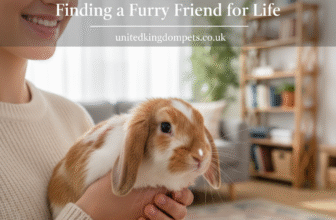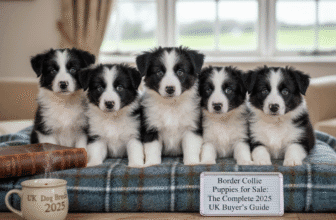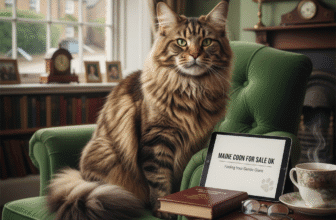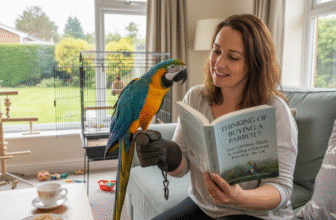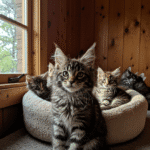
Thinking of Bringing Home a Gentle Giant? Your Guide to Maine Coon Kittens in the UK
There’s something undeniably captivating about the Maine Coon cat. Perhaps it’s their sheer size, ranking them amongst the largest domestic cat breeds globally. Maybe it’s their luxurious, shaggy coat and magnificently bushy tail, hinting at wild origins. Or perhaps, most likely, it’s their famously gentle, friendly, and almost dog-like personality that has earned them the affectionate nickname “gentle giants.” If you’re reading this, chances are you’ve fallen under their spell and are considering welcoming a Maine Coon kitten into your UK home. It’s an exciting prospect, but one that requires careful thought and responsible planning.
Bringing any pet into your life is a significant commitment, and with a breed as unique as the Maine Coon, understanding their needs, temperament, and how to find a healthy, well-socialised kitten is paramount. This guide aims to walk you through everything you need to know about finding Maine Coon kittens for sale in the UK, from understanding the breed’s background to navigating the process of choosing a reputable breeder and preparing your home for your new arrival.
A Touch of History and Mystery: The Origins of the Maine Coon
The exact origins of the Maine Coon are shrouded in a delightful mix of folklore and educated guesses. As their name suggests, they hail from the state of Maine in the northeastern United States. Their development was undoubtedly shaped by the harsh New England winters, resulting in a hardy, resilient cat with a water-resistant coat and large, tufted paws acting like natural snowshoes.
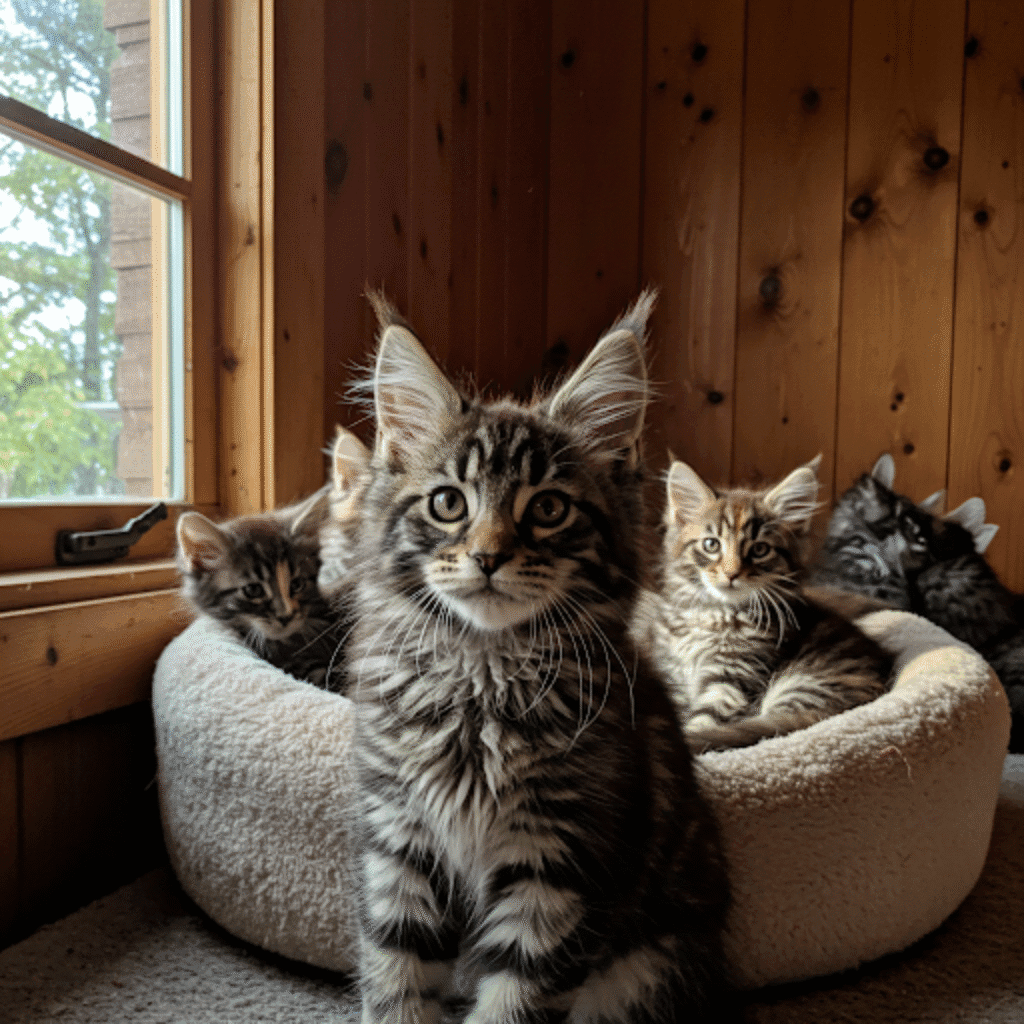
Several romantic (though biologically improbable) legends surround their beginnings. One popular tale suggests they are the result of crosses between domestic cats and raccoons – hence the bushy tail and the “Coon” part of the name. Another myth involves Marie Antoinette sending her beloved long-haired cats (possibly Turkish Angoras or Siberians) ahead to Maine while planning her escape from France. Yet another story links them to seafaring captains, like a Captain Charles Coon, who supposedly brought long-haired cats aboard his ships, which then mingled with local felines in Maine’s ports. A more plausible theory suggests they descended from long-haired cats brought over by early European settlers, possibly Norwegian Forest Cats introduced by Vikings or other long-haired breeds arriving with colonists, who then adapted to the local environment through natural selection.
Regardless of the precise ancestry, what emerged was a magnificent working cat, valued by farmers for its mousing skills. They were popular participants in early American cat shows in the late 19th century but saw a decline in popularity with the arrival of more exotic breeds. Thankfully, dedicated breeders ensured the Maine Coon’s survival, and today, they are one of the most beloved and recognisable cat breeds worldwide, cherished far beyond the shores of Maine.
The Gentle Giant Personality: What to Expect
While their size can be imposing, the Maine Coon’s temperament is typically anything but. They are renowned for being exceptionally good-natured, sociable, and affectionate cats. They often form strong bonds with their human families and enjoy being involved in household activities, often following their owners from room to room like furry supervisors.
Key personality traits include:
- Friendliness: Generally welcoming towards strangers and often get along well with children and other pets, including dogs, when introduced properly.
- Playfulness: They retain a kitten-like playfulness well into adulthood. Expect them to enjoy interactive games, chasing toys, and exploring. Many even enjoy playing fetch!
- Intelligence: Maine Coons are smart cats that can be trained to respond to commands or even walk on a harness (with patience!). Their intelligence also means they require mental stimulation to prevent boredom.
- Vocality: While not typically loud or demanding, they are known for their unique vocalizations. Instead of standard meows, they often communicate with soft chirps, trills, and cheeps, adding to their endearing charm.
- Affectionate but Not Clingy: They enjoy human company and often like to be near their people, perhaps lounging nearby rather than constantly demanding lap time (though many do enjoy a good cuddle!).
Their laid-back and adaptable nature makes them suitable for various households, provided they have enough space and attention.
Majestic Appearance: The Physical Characteristics
The Maine Coon is instantly recognisable by its impressive physical attributes:
- Size: They are large cats, with males typically weighing between 13-18 pounds (or more!) and females slightly smaller, around 8-12 pounds. They have a long, rectangular body and are slow to mature, often not reaching their full size until 3-5 years old.
- Coat: Their crowning glory is their heavy, shaggy coat, which is shorter on the shoulders and longer on the stomach and britches. It has a silky texture and is water-resistant, an adaptation to snowy climates. Maine Coons come in a vast array of colours and patterns, though pointed patterns (like Siamese) or lilac/chocolate colours are not typically accepted in breed standards. Classic brown tabby is perhaps the most iconic look.
- Tail: Long, bushy, and tapering, often compared to a raccoon’s tail. They might wrap it around themselves for warmth when resting.
- Ears: Large, wide at the base, and set high on the head, often topped with distinctive tufts of fur (lynx tips), enhancing their wild appearance.
- Paws: Large, round, and well-tufted, acting like snowshoes and adding to their sturdy look.
- Eyes: Large, expressive, and slightly oblique. Eye colour can vary widely and doesn’t necessarily correlate with coat colour, except in pointed varieties (which are rare and often indicate crossbreeding).
Finding Your Maine Coon Kitten: The Search in the UK
This is where careful research and patience are essential. Bringing a healthy, well-adjusted kitten home starts with finding a responsible source.
The Importance of Reputable Breeders
The absolute best way to find a Maine Coon kitten is through a reputable, registered breeder. Avoid pet shops, online classifieds offering suspiciously cheap kittens, or “backyard breeders” who haven’t invested in the health and well-being of their cats.
What defines a reputable breeder?
- Registration: They should be registered with a recognised cat fancy organisation, such as the Governing Council of the Cat Fancy (GCCF) or The International Cat Association (TICA). This means they agree to abide by a code of ethics.
- Health Testing: They perform genetic health screening on their breeding cats for known hereditary conditions in Maine Coons, particularly Hypertrophic Cardiomyopathy (HCM), Hip Dysplasia (HD), and Spinal Muscular Atrophy (SMA). They should be transparent about these tests and willing to show you results.
- Home Environment: Kittens should be raised underfoot in the breeder’s home, not in cages. This ensures they are well-socialised with people, household noises, and potentially other pets from a young age.
- Knowledgeable & Passionate: A good breeder loves the breed, is knowledgeable about their lines, health, and care, and is happy to answer all your questions. They will also ask *you* questions to ensure their kitten is going to a suitable, loving home.
- Documentation: They provide a contract, pedigree registration papers (often provided after proof of neutering), vaccination records, and microchip details.
- Kitten Readiness: They will not let kittens go to new homes before they are at least 12-13 weeks old, often older. This allows kittens crucial time with their mother and siblings for learning social skills and ensures they have completed their initial vaccinations.
Where to Look for Breeders
- Cat Fancy Organisations: Check the breeder lists on the GCCF and TICA websites.
- Breed Clubs: Look for UK-based Maine Coon breed clubs; they often have breeder directories or contacts.
- Cat Shows: Attending a cat show is a fantastic way to see Maine Coons up close, talk to breeders and owners, and make connections.
The Process: What to Expect
Once you’ve identified potential breeders, contact them to inquire about available kittens or waiting lists. Be prepared for the breeder to vet you as much as you vet them.
Arrange a visit to the cattery (which should be their home). Observe the environment – is it clean? Do the cats seem healthy and happy? Ask to meet the kitten’s mother (and father, if he lives there). Seeing the parents gives you an idea of the temperament and appearance your kitten might develop.
Spend time interacting with the kittens. Don’t just pick the first one that runs to you; observe their personalities. Discuss health screening, the kitten’s diet, litter training, and socialization process with the breeder. Review the contract carefully before committing. Most breeders require a deposit to reserve a kitten.
Understanding the Cost
Maine Coon kittens from reputable UK breeders are not inexpensive. Prices can range significantly, often from £800 to £1500 or even more, depending on lineage, location, and whether the kitten is intended as a pet or for showing/breeding (pet kittens are typically sold with a neutering agreement).
Why the high cost? It reflects the breeder’s investment:
- Cost of acquiring and caring for breeding cats.
- Extensive health screening (DNA tests, echocardiograms for HCM, hip x-rays).
- High-quality food for mother and kittens.
- Veterinary care (vaccinations, microchipping, health checks).
- Registration fees.
- Time and effort spent raising and socialising kittens properly.
Remember, the initial purchase price is just the beginning. Factor in ongoing costs: high-quality food, pet insurance (highly recommended), annual vet check-ups and boosters, grooming tools, litter, toys, scratching posts, and potential future vet bills.
Red Flags: Signs of Irresponsible Sellers
Be wary if you encounter:
- Kittens offered at unusually low prices.
- Seller unwilling to let you visit their home/cattery or meet the mother cat.
- Kittens being sold younger than 12 weeks.
- No evidence of health testing or vaccinations.
- Dirty or overcrowded conditions.
- Seller has many different breeds available.
- High-pressure sales tactics or unwillingness to answer questions.
- No contract or registration papers offered.
- Meeting arranged in a public place (e.g., car park) rather than the breeder’s home.
Trust your instincts. If something feels off, walk away. Supporting irresponsible breeders perpetuates poor practices and health problems.
Health Matters: Keeping Your Maine Coon Healthy
While generally a robust breed, Maine Coons are predisposed to certain genetic conditions. Responsible breeding aims to minimise these risks, but awareness is key.
- Hypertrophic Cardiomyopathy (HCM): A heart condition causing thickening of the heart muscle. Reputable breeders screen their cats via DNA tests and regular echocardiograms (heart scans).
- Hip Dysplasia (HD): A malformation of the hip joint that can lead to arthritis. Screening is done via x-rays.
- Spinal Muscular Atrophy (SMA): A genetic disorder causing muscle weakness and degeneration in the hind limbs. A DNA test is available.
Beyond genetics, ensure routine preventative care: vaccinations against common feline diseases, regular flea and worm treatment, dental check-ups, and annual wellness exams with your vet.
Caring for Your Gentle Giant: Day-to-Day Needs
Once your kitten comes home, providing the right care is crucial for their well-being.
- Nutrition: Feed a high-quality, protein-rich diet appropriate for their age and size. Consult your breeder and vet for recommendations. Ensure constant access to fresh water – many Maine Coons enjoy drinking from fountains.
- Grooming: Despite the long coat, it’s relatively easy to maintain if done regularly. Brush your Maine Coon 2-3 times a week with a good quality comb or brush to prevent mats, paying extra attention to the belly, armpits, and britches. Check ears and trim nails as needed.
- Environment: Provide plenty of space to roam and play. Invest in tall, sturdy cat trees and scratching posts – they love to climb and need appropriate outlets for scratching. Interactive toys will keep their intelligent minds engaged. Due to their size and trusting nature, keeping them as indoor cats or providing safe outdoor access via a secure garden or ‘catio’ is strongly recommended in the UK to protect them from traffic and theft.
- Social Interaction: Continue to socialize your kitten. Provide plenty of playtime and affection. Maine Coons thrive on companionship.
Is a Maine Coon Right for You?
Maine Coons make wonderful companions for the right homes. They suit families, singles, and experienced cat owners who appreciate their size, intelligence, and affectionate nature. Consider if you have the space, time for grooming and play, and budget for their care, including potential health needs. Their gentle, adaptable personalities make them incredibly rewarding pets for those prepared to meet their needs.
Considering Adoption
While this guide focuses on finding kittens, remember that breed-specific rescue organisations sometimes have adult Maine Coons or Maine Coon mixes needing loving homes. Adoption can be a wonderful alternative, offering a second chance to a deserving cat.
Conclusion: The Reward of a Gentle Giant
The journey to finding a Maine Coon kitten in the UK should be approached with diligence and responsibility. By choosing a reputable breeder who prioritises health and socialization, you are investing in a happy, healthy companion for potentially 12-15 years or more. The imposing size of the Maine Coon is beautifully balanced by its gentle spirit and playful heart, making it a truly unique and cherished member of any family lucky enough to share their home with one. Prepare for purrs that rumble, playful antics that delight, and a loyal friend who will likely supervise your every move with a loving chirp.



